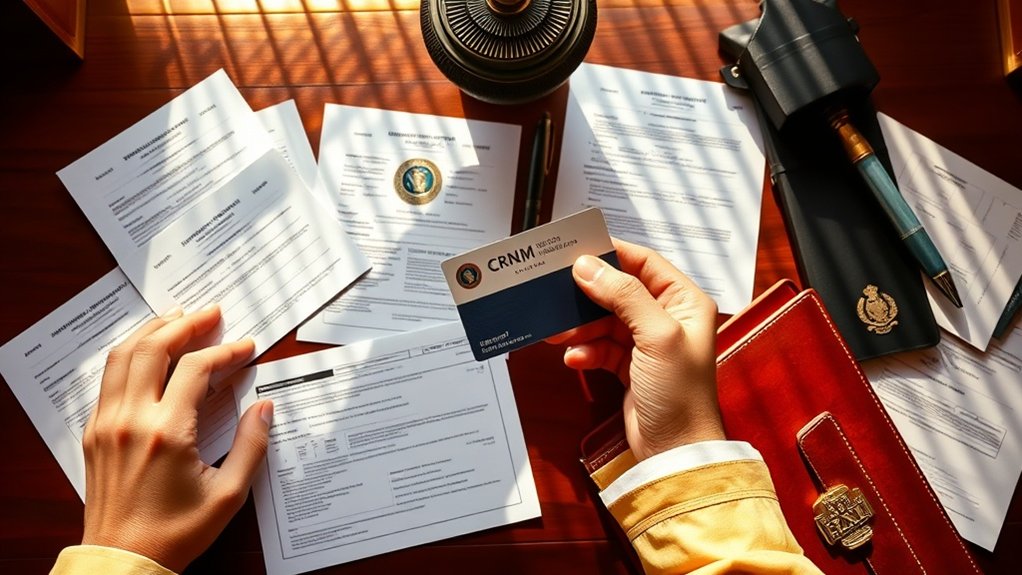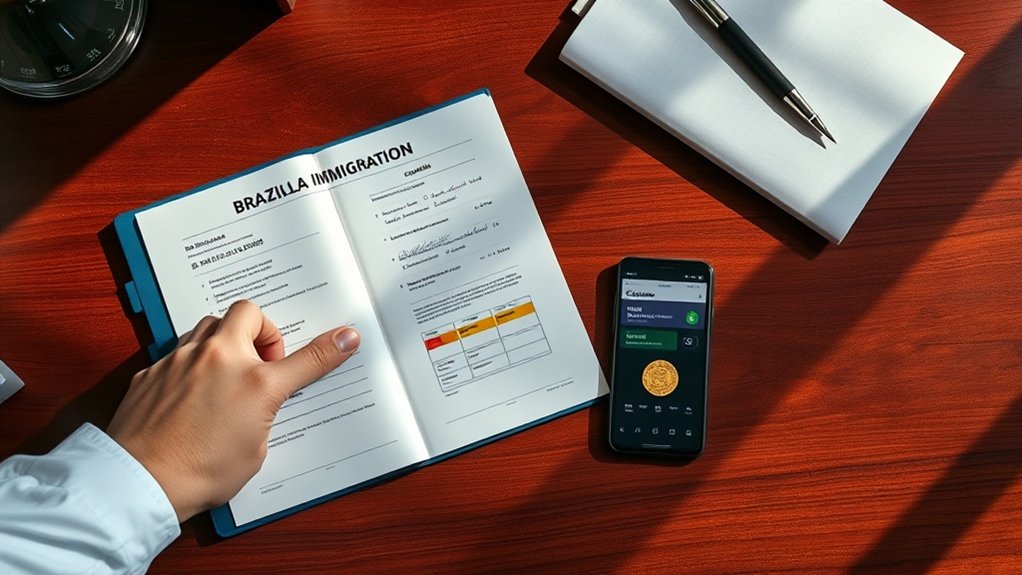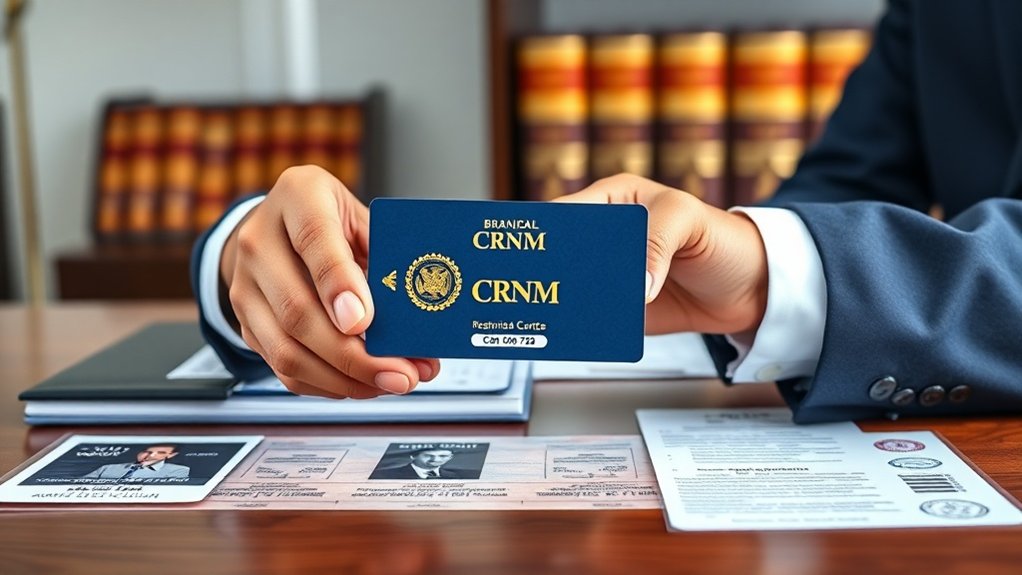You’re facing Brazil’s complex immigration process, and you need more than just hope that your CRNM application will progress smoothly. Vieira Braga Advogados transforms the uncertainty of immigration timelines into a structured roadmap, mapping every critical milestone from your initial Federal Police submission through final card delivery. Their systematic approach doesn’t just track progress—it anticipates bottlenecks before they derail your plans, but there’s a specific methodology that makes their timeline mapping particularly effective.
Understanding Brazil’s Immigration Documentation Requirements and Legal Framework

When you’re planning to immigrate to Brazil, you’ll encounter a complex web of documentation requirements that vary significantly depending on your visa category, country of origin, and intended purpose of stay. Brazil’s immigration framework operates under Law 13.445/2017, which replaced the outdated Foreigner Statute and established more streamlined processes.
You’ll need to navigate federal agencies including the Federal Police, Ministry of Justice, and consular services. Essential documents typically include your passport, criminal background checks, medical certificates, proof of financial support, and specific forms related to your visa type. Work visas require employment contracts and company documentation, while family reunification demands relationship proof and sponsor guarantees.
Each document must meet strict authentication requirements, often requiring apostille certification or consular legalization. Processing times vary considerably, and incomplete submissions result in delays or rejections. Understanding these requirements upfront prevents costly mistakes and ensures your application progresses smoothly through Brazil’s bureaucratic system. Given the complexity and constant updates of Brazilian immigration laws, many applicants find that legal guidance significantly increases their chances of approval and helps avoid severe administrative consequences.
Pre-Application Assessment and Document Preparation Phase
You’ll need to complete a comprehensive document checklist verification before submitting your Brazilian immigration application. This phase requires you to analyze your eligibility requirements against current legal standards and compile all supporting evidence that demonstrates your qualification for the specific visa category. Your preparation during this stage directly impacts your application’s success rate and processing timeline. Working with specialized legal support ensures personalized case analysis and proper preparation of required documentation to minimize risks of application delays or denial.
Document Checklist Verification
Document checklist verification forms the foundation of your successful application process, ensuring you’ve gathered all required materials before submission. You’ll need to systematically review each document against official requirements, checking for completeness, accuracy, and proper formatting. Your passport must have sufficient validity, while educational certificates require proper apostille or consularization depending on your country of origin.
Don’t overlook supporting documents like criminal background checks, which must be recent and properly authenticated. Financial statements need current dates and official signatures. Marriage certificates, birth certificates, and medical exams must meet specific criteria outlined by Brazilian immigration authorities.
Organized and updated documentation expedites the immigration process and helps avoid common pitfalls that lead to application delays.
Vieira Braga’s experienced team conducts thorough document audits, identifying potential issues before they delay your application. This proactive approach prevents costly rejections and timeline extensions.
Eligibility Requirements Analysis
Before submitting your Brazilian visa application, understanding your specific eligibility requirements prevents wasted time and resources on unsuitable pathways. Vieira Braga Advogados conducts comprehensive eligibility assessments that examine your personal circumstances against current immigration regulations. You’ll receive detailed analysis of multiple visa categories, including investment visas, work permits, family reunification, and retirement options.
The firm evaluates your financial standing, professional qualifications, criminal background, and health status to determine which pathways align with your profile. They’ll identify potential disqualifying factors early, allowing you to address issues before formal submission. This analysis includes reviewing income requirements, investment thresholds, and documentation standards for your chosen visa category. You’ll understand exactly what’s needed to meet Brazil’s stringent eligibility criteria, ensuring your application follows the most viable route. The New Migration Law introduced significant changes that require expert navigation to ensure compliance with current regulations and avoid complications from outdated information.
Supporting Evidence Compilation
After confirming your eligibility pathway, gathering the required supporting evidence becomes your next critical milestone in the Brazilian visa process. You’ll need to compile documents that prove your qualifications, financial stability, and clean criminal record. Essential paperwork includes your passport, birth certificate, educational diplomas, employment letters, and bank statements covering the last three months. Each document must be apostilled and translated by certified Brazilian translators. Don’t overlook specialized requirements like professional licenses or marriage certificates if applicable. Organization is crucial—create digital and physical copies of everything. Missing or improperly formatted documents can delay your application significantly. Start collecting evidence early, as some items like FBI background checks can take weeks to obtain. Professional legal assistance can help mitigate common documentation errors that frequently delay or jeopardize visa applications.
Federal Police Submission Process and Initial Review Timeline
Once you’ve gathered all required documentation, the Federal Police submission process begins with filing your application at the designated regional office or through their online portal. You’ll receive a protocol number that serves as your tracking reference throughout the entire process.
The initial review phase typically spans 15-30 business days, during which Federal Police officers examine your documentation for completeness and authenticity. Here’s what happens during this critical period:
- Document verification – Officers authenticate all submitted paperwork and cross-reference information with government databases
- Background screening – Your criminal history undergoes thorough review across multiple jurisdictions
- Compliance assessment – Immigration status and legal entry requirements receive detailed evaluation
- Administrative processing – Your file moves through various departmental checkpoints for approval stamps
You can monitor progress through the Federal Police’s online tracking system using your protocol number. Most applications advance to the next stage within this timeframe unless additional documentation requests arise. Similar to U.S. Green Card applications, the process requires proper documentation, timing, and often professional guidance to navigate successfully.
CNIg Evaluation Procedures and Ministry of Justice Coordination

Once the Federal Police completes their initial review, your application moves to the CNIg (National Immigration Council) for comprehensive evaluation under specific procedural guidelines. You’ll need to ensure all Ministry of Justice coordination requirements are met during this phase, as they directly impact processing efficiency. The CNIg follows established timeline standards for their assessment, though actual duration depends on your case’s complexity and completeness of documentation. Professional legal representation ensures compliance with immigration laws and reduces the risk of errors that could delay your CRNM application during this critical evaluation phase.
CNIg Application Review Process
When your CNIg application reaches the National Immigration Council, it enters a structured evaluation process coordinated directly with the Ministry of Justice and Public Security. This multi-stage review ensures compliance with Brazilian immigration regulations while maintaining processing efficiency.
The CNIg evaluation follows these critical stages:
- Initial Documentation Review – Verification of submitted documents against regulatory requirements and completeness standards
- Technical Analysis – Assessment of your professional qualifications, employment terms, and labor market impact considerations
- Inter-ministerial Consultation – Coordination with relevant government agencies for specialized cases requiring additional expertise
- Final Deliberation – Council members vote on your application based on comprehensive evaluation findings and legal compliance
Each stage involves specific timelines and may require additional documentation. Understanding this process helps you anticipate potential delays and prepare responsive materials when needed. Having specialized guidance throughout this complex evaluation process can significantly enhance your chances of approval by ensuring proper documentation preparation and strategic case presentation.
Ministry Coordination Requirements
Throughout the CNIg evaluation process, the Ministry of Justice and Public Security maintains direct oversight through established coordination protocols that streamline communication between council members and government agencies. You’ll encounter multiple touchpoints where ministry officials coordinate with various departments to verify your application details and supporting documentation.
The ministry’s coordination extends to the Federal Police, Labor Ministry, and other relevant agencies that contribute to your case evaluation. You’ll notice this coordination affects your timeline, as ministry officials must reconcile information across departments before proceeding with decisions.
Your application moves through coordinated checkpoints where ministry representatives ensure compliance with federal immigration policies. This systematic coordination prevents delays by establishing clear communication channels, though complex cases may require additional inter-ministerial consultations that extend processing timeframes.
Given the complexity of these coordination requirements and the risk of missing important deadlines, securing professional legal guidance ensures your application navigates these multi-departmental processes without complications.
Evaluation Timeline Standards
While CNIg evaluation timelines follow established standards, your specific case duration depends on several interconnected factors that Ministry of Justice officials carefully monitor.
The standardized evaluation framework establishes clear benchmarks for processing your CRNM application. However, you’ll encounter varying timelines based on your case’s complexity and documentation completeness.
Key evaluation timeline factors include:
- Documentation verification period – Complete submissions accelerate processing significantly
- Inter-ministerial consultation requirements – Complex cases require additional departmental coordination
- CNIg session scheduling – Regular meetings determine when your case receives formal evaluation
- Appeal or clarification periods – Additional information requests extend standard timelines
Understanding these standards helps you anticipate realistic processing expectations. Ministry coordination ensures thorough evaluation while maintaining procedural consistency across all applications, though individual circumstances will ultimately determine your specific timeline experience.
Professional legal assistance reduces risks and expedites decision-making throughout the complex CRNM application process.
Application Status Monitoring and Potential Delay Management

Since Brazilian immigration applications can face unexpected delays due to documentation reviews, policy changes, or administrative backlogs, you’ll need a systematic approach to monitor your case’s progress. Vieira Braga Advogados establishes proactive monitoring protocols that track your application through each processing stage.
You’ll receive regular status updates through their digital client portal, which displays real-time case progression indicators. Their team maintains direct communication channels with relevant government agencies, enabling immediate identification of potential bottlenecks or additional documentation requests.
When delays occur, they implement strategic intervention measures. This includes filing formal inquiries with processing offices, escalating cases through appropriate administrative channels, and preparing contingency documentation to address common delay triggers.
Their delay management system categorizes potential setbacks by severity and probability, allowing you to understand realistic timeline adjustments. You’ll also receive alternative pathway recommendations if standard processing encounters significant obstacles, ensuring your CRNM application maintains forward momentum despite bureaucratic challenges.
Final Approval Notifications and CRNM Card Production
Once your CRNM application receives final approval from the Federal Police, you’ll receive official notification through multiple channels managed by Vieira Braga Advogados. This marks a critical milestone in your immigration journey, as the approval triggers the immediate commencement of your CRNM card production process.
The notification and production sequence follows this structured timeline:
- Official approval confirmation arrives within 24-48 hours via email and client portal updates
- Federal Police database registration occurs automatically, establishing your legal resident status
- CRNM card printing authorization begins at the designated production facility within 5-7 business days
- Quality control and shipping preparation takes an additional 3-5 business days before dispatch
Vieira Braga Advogados monitors each production stage, providing real-time updates about your card’s manufacturing progress. You’ll receive tracking information once your CRNM card ships, typically arriving within 10-15 business days from approval notification.
Post-Approval Services and Residency Status Maintenance

After receiving your CRNM card, Vieira Braga Advogados continues providing essential services to ensure you maintain your legal residency status in Brazil. They’ll guide you through renewal procedures, tax obligations, and compliance requirements that protect your legal standing.
| Service Category | Specific Support |
|---|---|
| CRNM Renewal | Document preparation and submission assistance |
| Tax Compliance | Annual tax return filing and obligation guidance |
| Status Changes | Marriage, divorce, or employment status updates |
| Travel Documentation | Re-entry permits and travel authorization support |
| Legal Updates | Ongoing immigration law changes and impacts |
The firm monitors your residency timeline, sending reminders before renewal deadlines and ensuring you meet physical presence requirements. They’ll handle any status modifications if your circumstances change, whether through marriage, career changes, or family situations. Their ongoing support prevents costly mistakes that could jeopardize your residency. You’ll have access to updated legal guidance as Brazil’s immigration policies evolve, maintaining your compliant status throughout your residency journey.
Frequently Asked Questions
What Are Vieira Braga Advogados’ Fees for Complete CRNM Application Assistance?
You’ll need to contact Vieira Braga Advogados directly for their specific CRNM application fees, as they don’t publicly list standardized pricing. Their fees typically depend on your case’s complexity, required documentation, and timeline needs. They’ll likely offer a consultation to assess your situation and provide a detailed quote covering all services from initial filing through receiving your CRNM in hand.
Can Family Members Apply for CRNM Simultaneously Through Your Firm?
Yes, you can apply for CRNM simultaneously with your family members through our firm. We’ll coordinate all applications together, ensuring consistent documentation and streamlined processing. This approach often proves more efficient since we can align timelines, prepare comprehensive family documentation packages, and monitor all cases collectively. You’ll benefit from coordinated communication, unified strategy, and potentially reduced overall processing time for your family’s residency applications.
Does Vieira Braga Advogados Handle Emergency or Expedited CRNM Processing Requests?
You can request expedited CRNM processing through Vieira Braga Advogados in certain emergency situations. They’ll evaluate your case to determine if you meet the criteria for urgent processing, such as medical emergencies, job requirements, or family situations. The firm will prepare additional documentation justifying the expedited request and submit it to the appropriate authorities. However, approval isn’t guaranteed and depends on immigration officials’ discretion regarding your specific circumstances.
What Happens if My CRNM Application Is Denied by CNIG?
If your CRNM application’s denied by CNIg, you’ll receive an official notification explaining the rejection reasons. You can’t resubmit the same application, but you can file a new one addressing the issues that caused the denial. Alternatively, you can appeal the decision through administrative channels within specific timeframes. Vieira Braga Advogados can help you understand the denial reasons, prepare a stronger reapplication, or guide you through the appeals process to maximize your chances of approval.
Can I Travel Internationally While My CRNM Application Is Pending?
You can travel internationally while your CRNM application is pending, but you’ll need to use your original passport and any existing visas. You won’t have the CRNM card yet, so you can’t rely on Brazilian residency status for travel. Make sure you can re-enter Brazil with your current documentation. Check visa requirements for your destination country based on your current passport, not pending Brazilian residency.
Conclusion
You’ve navigated Brazil’s complex immigration process with strategic timeline mapping that transforms uncertainty into clarity. From your initial document preparation through CNIg evaluation and final CRNM receipt, you’ll experience streamlined coordination across multiple government agencies. With proactive delay management and continuous status monitoring, you’re positioned for successful approval while maintaining full visibility into each critical milestone. Your residency journey becomes predictable, efficient, and strategically managed from start to finish.



